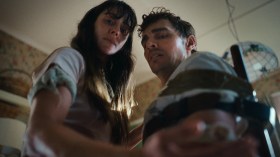Yorgos Lanthimos is a director who doesn’t mind torturing his audience. He’ll take you into dark, weird places and subject you to sudden bursts of violence. Even worse, he makes you sit in discomfort, watching awkward characters do absurd, sometimes cruel, things that just don’t make much sense.
But for some, such suffering is bliss. You could say Lanthimos understands sadomasochism. (Don’t mistake this with ‘torture porn’ though; this is quite different.)
If you enjoyed watching Lanthimos’s gorgeous, fantastical science-fantasy Poor Things (2023), or the kinky, darkly delicious The Favourite (2018), you’d be forgiven for calling him ‘fun’. But those are his easy films.
Read: Poor Things review: a fabulous feminist odyssey
His latest, Kinds of Kindness (releasing 11 July) looks like a return to challenging and potentially disturbing form. There are pleasures to be had of course – see Gabrielle O’Brien’s five-star ScreenHub review – but before you go, it pays to know what you’re in for.
Here’s a quick (by no means comprehensive) explainer to get you up to speed with Yorgos Lanthimos, one of the world’s most interesting and astonishing directors making films for the ‘mainstream’ right now.
Read: Kinds of Kindness review: such dark delights
Who is Yorgos Lanthimos?
Lanthimos is the most prominent of a group of contemporary postmodern Greek filmmakers known as the ‘Greek Weird Wave’.
Born in 1973, the writer and director started his career in experimental theatre in Athens, where he made short films, music and dance videos, and he was even part of the creative team behind the opening ceremony for the 2004 Summer Olympics in Athens. While he was growing up, the film industry in Greece was very sparse and underfunded, and Lanthimos has said he never ever dreamed he’d get to make films.
He made his directorial debut in 2001 with the sex comedy My Best Friend (co-directed with Lakis Lazopoulos), but broke through with the psychological drama Dogtooth in 2009.
This film about a couple who keep their adult children imprisoned in a compound away from the real world, won Un Certain Regard at Cannes and was nominated for an Academy Award for Best Foreign Language Film. This was the start of an award-winning career that’s included a BAFTA, a Golden Globe, a Venice Golden Lion (for Poor Things) and multiple Oscar nominations.
Lanthimos’s fourth feature film was the morbidly funny Greek film, Alps (2011), following actors who start a unique business impersonating deceased people to help their clients through the grieving process. Among other accolades, Alps won the $60,000 Sydney Film Prize in 2012, with Jury Chair Rachel Ward saying it was ‘a finely calibrated, absurdist study of power and identity … intelligent, uniquely emotive filmmaking from an important new voice in Greek cinema’.
Transitioning to English-Language and Hollywood stars
Lanthimos made the transition to English-language films with the black comedy The Lobster (2015), another absurdist black comedy, starring Colin Farrell and Rachel Weisz as singletons living in a hotel and forced to find their soulmate in 45 days, lest they be transformed into animals.
Farrell was back in The Killing of a Sacred Deer (2017), opposite Nicole Kidman, in the deeply disturbing horror story about a surgeon who introduces his family to a teenage boy (Barry Keoghan) with a connection to his past, after which they mysteriously begin to fall ill.
The Favourite (2018), written by Deborah Davis and Australian screenwriter Tony McNamara, featured Olivia Colman, Emma Stone and Rachel Weisz in a dark power play comedy loosely based on the historical figure of Queen Anne and her subjects.
What are his themes?
Lanthimos loves to explore power dynamics between mismatched characters in tightly constrained social settings. He goes there, thematically if not explicitly, with sexually taboo subjects such as incest and rape and bodily disfigurement.
His films also delve into the nature of sociopolitical influence, and the randomness or predetermination of fate. His characters often make bargains that only gradually become comprehensible.
Why do we love him?
Lanthimos doesn’t seem to need us to love him or like him, and that’s a relief. In these days of predictable ‘please like me’ blockbusters and endless insecure sequels, it’s nice to know you’re in the hands of an artist who’ll do what he wants to, even if it drives us a little crazy.
Why do we hate him?
See above. It’s not easy watching some someone have their eyes gouged out or seeing them forced to make the choice of which family member will die first. Awkward adults in sterile environments is par for the course with Lanthimos, and it’s not always pretty or ‘cinematic’. Endings can be ambiguous and leave you without the sense of total satisfaction.
What are his signature elements?
Lanthimos likes to show us childlike characters dealing with loss and longing or making excruciating choices. There’s deadpan acting and stilted speech. Don’t expect naturalism! You’ll often see odd behaviour, dark humour, blindfolds. Stylistically, look out for odd camera angles, slow motion, characters framed so their heads are cut off, handheld tracking shots, and silence interspersed with sudden bursts of violence or noise.
Frequent collaborators
Lanthimos’s partner is Greek-French actress Ariane Labed, who starred in the 2010 hit Attenberg, which he co-produced. They met on set and married in 2013. Labed also starred as a gymnast in his 2011 film Alps. Other frequent collaborators include screenwriter Tony McNamara and actors Colin Farrell, Rachel Weisz and Emma Stone.
What’s next after Kinds of Kindness?
In May it was announced that Emma Stone and Jesse Plemons have been cast in a remake of the 2003 Korean science fiction comedy Save the Green Planet with Ari Aster (Midsommar) as co-producer.
Titled Bugonia, the film is aimed for a November 2025 release. The synopsis: ‘The film follows two conspiracy obsessed young men who kidnap the high-powered CEO of a major company, convinced that she is an alien intent on destroying planet Earth.’ We can only imagine what weirdness Lanthimos will wreak from such a plot.
It has also been reported that he is working on an adaptation of Ottessa Moshfegh’s novel My Year of Rest and Relaxation.
What does he say about his films?
Speaking to the Guardian in 2023, Lanthimos was asked about his favourite films: ‘“They are all problematic children,” he sighs, “all problematic in different ways.”’
The Yorgos Lanthimos films to catch up with
- Kinetta (2005) – Lanthimos’s solo directorial debut
- Dogtooth (2009)
- Alps (2011)
- The Lobster (2015 )
- The Killing of a Sacred Deer (2017)
- The Favourite (2018)
- Poor Things (2023)
- Kinds of Kindness (2024)





